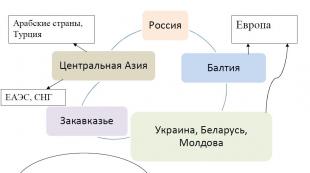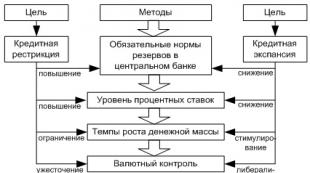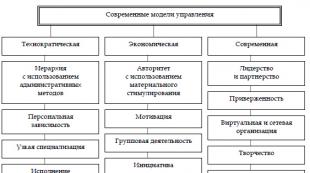Accounting theory for beginners. Accounting for beginners: step by step training. Types of accounting accounts, description and application
This short course is designed for those who study accounting as an academic discipline. The author of the course sets himself the task of explaining the basics of accounting for beginner accountants, for those who want to master this interesting specialty. Why the basics? Because if we consider accounting as one of the types of human activity, we must understand that the accounting system itself was not formed immediately, in an instant, but how science has developed throughout the history of human development.
Useful literature for a beginner accountant
For the first time, it was systematized in the Renaissance, during the time of Leonardo da Vinci, by the great mathematician of his time, Luca Pacioli, in 1494 in the scientific work Treatise on Accounts and Records. Any science is based on specific techniques and methods, accounting work is specific and has its own techniques and methods, namely, accounting provides for the following different techniques and methods: inventory, system of accounts and double entry, etc. In everyday work, accounting, depending on the industry and the taxation system, has its own industry-specific features, some economic phenomenon must be reflected in accounting, some is reflected in a specific, industry-specific manner. Accounting covers wages, materials and inventories, fixed assets, the production and sales process, financial results, and finally, the financial results of any organization are determined by accounting. It is almost impossible to overestimate the importance of accounting in the activities of enterprises and organizations, as well as in general for the economy of our country. However, in the course of his work as chief accountant, the author of this course had to constantly come across reforms carried out by reformers from accounting. Constantly, under the pretext of ongoing reforms, changes in accounting are being formalized, accounting entries are becoming more complicated, forgetting about the tasks of accounting for a quick and correct assessment of the enterprise's activities and the financial condition of the enterprise. Accounting should cover all business operations of the enterprise, industry. The accounting department of the enterprise is designed to quickly and accurately solve all the tasks assigned to it. The accounting department of any enterprise should be headed by knowledgeable specialists who are well versed in theory and practice. This course is designed to help you navigate the rapidly changing accounting legislation, an accountant must know the basics of accounting well, distinguish between new and useful in accounting, from unnecessary, far-fetched and sometimes not feasible at all, due to the realities of the economic life of an organization, enterprise. The author of the course is grateful to you for taking the time to study this course and hopes that you have gained some benefit from the study of accounting in the light of the materials of this work.
Accounting made easy
This site is dedicated to the basics of accounting and is intended for those who have had to deal with this subject, who find it difficult and incomprehensible. As practice shows, the authors of accounting textbooks, although they try to offer as much information as possible about the subject, features and subtleties of accounting, often pay little attention to the basics, considering them obvious. This is a serious obstacle for beginners who are just beginning to study this subject. Beginners get the impression that it is impossible to understand accounting. The authors of this site will try to dispel this myth.
Who is this site for? First of all, for those who are faced with the study of accounting, and consider accounting a difficult, overwhelming science. It can be not only university students, college students, novice accountants, but also experienced employees who had to move to a new site. We can assume that the proposed materials are an online textbook on accounting or an online textbook on accounting.
For an in-depth study of accounting, we recommend stocking up on textbooks and turning to sources - legislative and regulatory acts. The authors of the site did not set themselves the task of creating a complete guide to all areas of accounting. The purpose of this project is to provide answers to simple and complex questions of newbies that they are embarrassed to ask, or there is simply no one to ask them. Only having a complete understanding of the basics, you can proceed to the study of more complex things. Then you can say with confidence that accounting is not so difficult at all.
Accounting for dummies in plain language
The website section of the accounting task contains examples of solutions and examples of accounting entries for individual accounting areas. The given examples of problem solving should help beginners in solving problems that they will encounter when studying accounting.
The useful information section contains methodological materials that will be useful in the study of accounting.
For self-checking in the accounting tests section, you can find tasks selected for individual topics. With the help of tests, you can test your ability to answer questions correctly. The correct answers to the accounting tests can be viewed immediately.
Management Accounting
A separate category of the site is devoted to management accounting as one of the accounting subsystems. Management accounting is usually studied within a separate discipline outside the subject of accounting. The management accounting section of our website has a similar structure and also contains management accounting tasks and management accounting tests.
Sometimes clients come with a question: we want to register an LLC and engage in commercial activities. Tell me where to start accounting and how much such services will cost if they are provided by SaldoConsult specialists.
We thought and decided to suggest how to organize accounting for those who decide to keep records and submit reports on their own.
Recall that since 2013, all companies are required to keep accounting records, regardless of the applicable taxation system, except for Individual Entrepreneurs.
First you need to decide on the choice of taxation system. This is best done at the LLC registration stage. Most entrepreneurs choose the Simplified Taxation System (STS).
But the tax base can be different:
- if a significant share of expenses is expected, select “Income minus expenses”, the tax rate in this case in St. Petersburg is 10%,
- if there are not many expenses, choose “Income” 6%.
It is possible that the type of activity that you are going to organize is subject to taxation by the Uniform Imputed Income Tax (ENVD). Since 2013 the regime is optional. To understand whether it is beneficial to use it or not in each specific case, it is necessary to make calculations.
We thought, decided, gave the documents for registration.
Let's move on to buying software..
At the moment, many entrepreneurs use Elba electronic accounting or the 1C-Accounting program. Elba is convenient because it is a “cloud” solution and you will not need to keep track of changes in software releases and reporting forms. In addition, the existing hint system allows even beginners to keep records on their own.
There is another solution "1C-Accounting". As in the first case, a cloud solution is also presented here. If you decide to purchase a “yellow box” and install it on your computer, this option will be inexpensive, especially the basic versions. They regularly have discounts. The basic version will be updated every time the program is launched via the Internet.
Decide whether you will submit reports to the Pension Fund and the Social Insurance Fund and declarations to the State Tax Inspectorate via telecommunications (via the Internet) or are you ready to run around the authorities with paper reports and flash drives.
We advise you to immediately think carefully and find an opportunity connect to electronic reporting. You will save a lot of time. You will have access to electronic correspondence with the tax, PF, FSS, thanks to this, the opportunity to receive a reconciliation of calculations or send a request or a letter.
We draw up an Order on accounting policy.
A Short Course in Accounting for Dummies
To do this, you can use the numerous services that are available on the Internet. We print out one of these orders, check that all accounting points are reflected in the Order.
We attach to the Order on accounting policy the Working Chart of Accounts and the forms of documents that will be used in the activity.
We draw up personnel orders. We described what personnel documents a company should have. Therefore, we suggest reading the relevant articles on our website. We advise you not to put off the personnel office work until later, because then there will be many other things to do and you simply will not have time. It is enough to prepare forms of documents, which you will then fill out as necessary.
Software selected, installed. We start working, fill in all the details of the company. For these purposes, the program has an "Assistant". We follow his instructions.
So we start economic activity and reflect all business operations in the program sequentially. We purchase goods, materials, receive advance payments from buyers. For all paper documents that we have, we create similar electronic documents in the program.
Is accounting complicated? Too many unknowns? Then for you - Tutorial "Accounting from scratch". Only 60 lessons - and you will understand that accounting is simple and interesting.
The self-instruction book is 60 lessons, 60 tasks with answers, an example of accounting in numbers and postings. All changes of 2018 are taken into account!
Bookkeeping Basics for Beginners:
| Lesson 1 | Basic terms and definitions, a theory without which it is impossible to move on |
| Lesson 2 | Everything related to the authorized capital of the enterprise (its accounting, increase, decrease) and settlements with the founders (dividends) |
| Lesson 3 | Cash and non-cash funds, foreign currency, checks, letters of credit, etc. |
| Lesson 4 | Receipt and disposal, depreciation, repair, modernization, revaluation, lease of fixed assets |
| Receipt and disposal of intangible assets, depreciation, revaluation | |
| Lesson 6 | Receipt leave from the warehouse, inventory of materials and write-offs of fuel and lubricants |
| Lesson 7 | The cost of production, the release of finished products, marriage |
| Lesson 8 | Settlements with suppliers, buyers and other counterparties |
| Lesson 9 | Features of the receipt and disposal of goods, as well as their movement within the organization |
| Lesson 10 | Salary, vacation, sick leave, benefits related to pregnancy, childbirth and childcare |
| Lesson 11 | Accounting and tax accounting of expenses at the enterprise |
| Lesson 12 | Summing up the results of the annual activity, consider the profit and loss |
Taxation for beginners
The presented lessons will allow you to quickly master the basics of accounting, learn how to calculate taxes. The material is aimed at beginners, information is provided free of charge.
The knowledge that can be obtained by studying the information in this tutorial will be useful to accountants for competent accounting in an enterprise, entrepreneurs and heads of organizations to understand the process and control their accountant, ordinary citizens in ordinary life situations to make the right decisions in matters related to finance.
Self-tuition book on accounting for beginners "Accounting from scratch" will help to master all the necessary knowledge for the competent organization of accounting and tax accounting in the enterprise.
Due to the fact that all the information is presented in a simple and accessible form, anyone who wants to master the knowledge of accounting and reporting from scratch will be able to understand it.
The articles of the tutorial are provided with examples that will make it easier to understand the rather complex material and allow you to consolidate the knowledge gained in practice.
The material is presented sequentially and divided into lessons. If you want to start learning accounting from the very beginning (from scratch), then you need to start with the section on accounting (that is, from the first lesson), then deal with tax accounting and taxation and finish with accounting and tax reporting.
Above you can go to any section or lesson that interests you.
Greetings, dear friends! Money loves an account, doesn't it? Do you know that if you keep a family budget, you can save a lot of money? Accounting is simply indispensable in order to keep everything under control both in the family circle, as well as in the organization . If you have been looking for the Bookkeeping Tutorial for Dummies to read in simple terms about the complex concept of accounting, then you are welcome! This article is just that.
Meet: the oldest profession on earth - an accountant!
Of course, with the most ancient profession, a little inflection. However, did you know that back in the 15th century, the Italians, namely the monks, invented one of the main principles of accounting? Yes, yes, so everyone hated the method of double recording was first described by the Italian monk Luca Pacioli. The principle of double entry has not changed in the last 500+ years. Accounting is a generalization of all available financial information, whether it is a family or a whole huge enterprise. If we consider accounting specifically at the enterprise, then it is conducted either by the director himself or by the chief accountant. If the company is small and does not require a chief accountant, then they use the services of third-party companies, i.e. receive outsourced services. By the way, do you know what it is? I advise you to learn more. Outsourcing is something that can also save you a lot of money.
What is the subject of accounting? First of all, this is all the property of the company and even its obligations. Thus, the debts of the enterprise, as well as the expected receipts from counterparties, will also be included in the balance sheet.
Why do you need to keep accounts? Accounting is one of the most important departments in a company, and if you can do without a marketing department, then no self-respecting entrepreneur has gone far without an accountant. Even in the family circle, it is customary to count money, what can we say about the place that is your second home? How, you haven't moved to work yet? Urgently deprive you of the award!
Accounting tasks include:
- compiling a complete picture of the activities of the enterprise;
- minimization of negative indicators of economic activity;
- search for reserves;
- control over the observance of legislative norms;
- control over the use of resources in the organization.
What does accounting include?
Accounting at the enterprise is carried out using the notorious program 1C: Accounting. Moreover, the accountant must understand document management, as well as be able to use Internet banking. In general, all accounting problems can be solved as follows:
- Documentation. A document is a confirmation that a business transaction took place. A properly executed document is a confirmation that professionals work at the enterprise.
- Grade. A valuation is an expression of a transaction in terms of its monetary value, i.e. Any business transaction must have a value expression.
- double entry. I advise you to get acquainted with debit and credit, if these two gentlemen have not already been introduced to you. Each operation must be duplicated so that you can verify the accuracy of the data. What is debit and credit in accounting, you can know superficially, if you, of course, are not an accountant.
- Calculations. Here you can do without further explanation. Accounting in its own words is a calculation made by an accountant.
- Balance- the main document in accounting. It can be requested by both tax authorities and contractors, and you should always be ready.
- Reporting- certain indicators grouped using tables for a specific reporting period. By the way, it is now possible to submit reports to the tax office online, if the enterprise had a digital signature.
Standing apart is such a moment in accounting as a chart of accounts. The chart of accounts is a whole system according to which operations are recorded and grouped in accounting. In addition to the listed components of accounting, it is worth noting that it is based on several principles. So, the principle of periodicity is considered the main principle, i.e. reporting for the month, quarter, half year and year. This allows you to compare indicators for different periods and see the development or, vice versa, the decline in the company's activities in dynamics.
Confidentiality is the second accounting principle. The vast majority of companies adhere to the principle that the balance sheet data of the organization is strictly confidential and it is forbidden to disclose it. The exception is a certain part of non-profit organizations.
We have already touched on the third principle - this is the monetary dimension, i.e. any business transaction in the company must have a value expression.
Separately, I would like to highlight a special nuance in accounting, namely the maintenance of documentation.
Documents are the basis of doing business, and it is with the help of them that all transactions are recorded.
A document is evidence, and evidence loves order. Any accountant pays special attention to maintaining archives, both in printed and electronic form, and also knows which documents are legally binding and which are not.
Only the documentation on which all the details are correctly placed has legal force. For example, if there is no signature on any primary documentation, then it will be impossible to take it into account.
Organizational form and accounting
You don't even have to look at Books From Scratch textbooks to determine if you need one or not. So, depending on the form of organization, a company can maintain full or simplified accounting. Of course, the choice of work as an individual entrepreneur, LLC or even JSC depends not only on the future form of accounting, however, it would be nice to get acquainted with the difference, which we will now do. IP is a form of business organization in which a legal entity is not created. An individual entrepreneur is primarily an individual who conducts activities for profit. An individual entrepreneur cannot have property separate from an individual and, therefore, if he becomes bankrupt, then everyone will have to pay, right down to the last thread.
LLCs and JSCs are organizations and they bear responsibility with their capital, and not with the property of the founders. Also, the difference lies in how many people can be directly involved in the management. Moreover, organizing an AO is somewhat more difficult.
Full-fledged accounting is maintained only in LLCs and JSCs, which implies the presence of both a balance sheet and profit and loss indicators, as well as full-fledged archiving. Individual entrepreneurs, according to Federal Law No. 402-FZ, have the right not to maintain full-fledged accounting. However, do not confuse accounting with its tax counterpart, since the IP must still submit reports to the Federal Tax Service.
The deadlines for filing reports are determined by the chosen taxation system. Most often, individual entrepreneurs choose a simplified taxation system, however, you can choose UTII, UAT, and even a patent. As a rule, for tax accounting, an individual entrepreneur is required to hire an accountant, unless, of course, he is able to keep records on his own.

Consider accounting for IP in more detail
The first and main point that needs to be urgently addressed is the hiring of workers. Are you ready to become an employer and be responsible for your wards? It is very difficult to be responsible for officially arranged people in your IP.
The accounting department of individual entrepreneurs after hiring employees is completely changing. So, for a given period of time, for 1 reporting year, you will have to submit as many as 7 reports, including to the Pension Fund, the Social Insurance Fund and, of course, to the tax office. And believe me, filing the average number of employees is the most innocuous thing you have to do.
That individual entrepreneurs and LLCs must comply with the reporting deadlines, otherwise there is a risk of running into fines (do you need this?). Penalties, arrears, blocking of the current account ... What kind of frills is not served on our accounting table by the generous tax inspectorate.  Whether you will keep accounting on your own or with the help of an accountant, I advise you to take this as seriously as possible. Use special software (1C, for example), and also save all the documents that you had to work with.
Whether you will keep accounting on your own or with the help of an accountant, I advise you to take this as seriously as possible. Use special software (1C, for example), and also save all the documents that you had to work with.
Hope you enjoyed the article. Maybe you are already an experienced accountant and you have something to add to my modest review? Waiting for your comments. See you soon!
P.S. Watch the video about accounting, they explain well and clearly.
Sincerely, Technical Experts.
Hello, friends!
I had a few free hours at work and I decided to run through the main news of the accounting world. On one of the pages, a very intriguing advertisement was found, the company promised to teach accounting for a month and immodest remuneration. Self-esteem jumped in me, I studied accounting for 5 years, and then a month and it's ready. How?
Friends, if you decide to learn accounting, bypass such "teachers". I decided to make a short thesis guide that will give an understanding of the scope and main topics of the upcoming studies, it will help save time, weed out tons of unnecessary information and will not affect the wallet.
- On the purposes, tasks and spheres of application.
- On the basic concepts of accounting.
- On the main sectors of accounting in the enterprise.
Pay attention to the basic concepts, they will occur throughout the learning process. From words to deeds!
How to find and select useful information?
 You started looking for information about accounting. Perhaps they went to bookstores and looked through the literature in the section "Accounting" and "Tutorials ...". We used the Internet and found even more books and essays. It turned out that information is just a sea, isn't it?
You started looking for information about accounting. Perhaps they went to bookstores and looked through the literature in the section "Accounting" and "Tutorials ...". We used the Internet and found even more books and essays. It turned out that information is just a sea, isn't it?
I'm sure you started reading these books and essays. You have spent time and effort to understand this bookkeeping. And more often it turned out that there was more and more incomprehensible, right? Less and less often you remember where you started and where you are going. You catch yourself thinking that you are trying to memorize all the concepts and definitions of accounting, but there is practically no progress, right?
And one unresolved question begins to spin in my head:
“So where do you start learning accounting?”
I have a good experience in making it easy, fast and efficient for a novice accountant to learn accounting. And in this article, I will share with you some points for a quick study of accounting. After all, that's what you want, isn't it? Like I once was looking for a plan where to start studying accounting.
- You should start studying accounting in order to give a novice accountant a clear general idea of the tasks of accounting and the subject area where accounting is used.
- The next step in learning accounting is to understand concepts such as financial results and taxation systems. A novice accountant needs to clearly understand the formula for the financial result and how it works, according to the rules of taxation systems.
- Further study of accounting for a novice accountant boils down to the following:
- understand and remember what main sections accounting consists of.
- how each of these sites, according to the taxation system, affects the financial result.
- What accounting tools are used to record the collection and change of information in accounting. Also, how information is classified. All this is the next stage in the study of accounting (see here).
- One of the very important skills of a novice accountant, when studying accounting, should be the ability to read reports and analyze the information visible in the reports.
- On cross-cutting practical tasks (mind you, not on one, but on several) to collect all the knowledge gained together.
For this item, it is necessary to have thoughtful sequential practical tasks and a mentor. The task of the mentor will be to connect the previously acquired knowledge with their correct application in practice.
And before I write the last point, I want to note that the study of accounting on these five points must be supported by practical tasks. Necessarily different practical tasks for the same situations. It is also necessary to ask questions so that the novice accountant, through reflections and answers, begins to capture the essence and the relationship between the knowledge gained.
I noticed that this approach allows a novice accountant to simply learn accounting faster and it becomes easier to get a job and immediately start maintaining accounting sections.
For an aspiring accountant, this approach is a golden opportunity to learn practical accounting, along with the necessary theory and a reserve for the future. And all this can be achieved in a record short time, because in the head of a novice accountant, when studying accounting, there will be no “porridge”, incorrect beliefs and conclusions, and questions that have not been answered.
Basic concepts
 Accounting - an ordered system of collecting, registering and summarizing information in monetary terms about the state of property, obligations of the organization and their changes (cash flow) through continuous, continuous and documentary accounting of all business transactions.
Accounting - an ordered system of collecting, registering and summarizing information in monetary terms about the state of property, obligations of the organization and their changes (cash flow) through continuous, continuous and documentary accounting of all business transactions.
The objects of accounting are the property of organizations, their obligations and business operations carried out by organizations in the course of their activities.
Accounting in accordance with the law on accounting can be maintained by: Chief accountant hired by the enterprise under an employment contract, general director in the absence of an accountant, accountant who is not the main or third-party organization (accounting support).
The main task of accounting is the formation of complete and reliable information (accounting statements) about the activities of the organization and its property status, on the basis of which it becomes possible:
- prevention of negative results of economic activity of the organization
- identification of on-farm reserves to ensure the financial stability of the organization
- control of compliance with the law in the implementation of economic operations by the organization
- control of expediency of business operations
- control of the presence and movement of property and liabilities
- control over the use of material, labor and financial resources
- control of compliance of activities with approved norms, standards and estimates
Internal users of financial statements - managers, founders, participants and owners of the organization's property.
External users of financial statements - investors, creditors, the state.
Accounting is closely related to tax and management accounting.
Source: http://answer.mail.ru/question/44699630
How to study accounting on your own?
 Accounting is a key process and one of the fundamental factors for successful business, regardless of the size and turnover of the company. While large companies maintain fairly numerous accounting departments on staff (or use the services of third-party firms that provide accounting and auditing services), small offices may have only one accountant.
Accounting is a key process and one of the fundamental factors for successful business, regardless of the size and turnover of the company. While large companies maintain fairly numerous accounting departments on staff (or use the services of third-party firms that provide accounting and auditing services), small offices may have only one accountant.
When working as an individual entrepreneur, it is often necessary to have the skills of independent accounting without the help of specialists. In this case, it may be necessary to understand accounting in order to independently conduct it. In addition, good knowledge of accounting can be used for employment as an accountant.
- If you have no knowledge at all in this area, then reading the literature is a great start. The best books for building basic skills, such as Accounting for Dummies, can be purchased at any bookstore. Studying this book and doing the practice exercises in it will give you a basic understanding of the fundamental principles of accounting.
- The Internet is a very useful tool for learning the basics of accounting in the shortest possible time, and for free. Sites like ours offer free lessons in many areas of accounting. In addition, you can view online the texts of all documents regulating accounting. On the Internet, you can easily find the standards adopted in your country, and, if necessary, international standards.
- After getting a basic understanding of accounting, you need to start studying textbooks compiled according to the university program. Look for relevant publications that provide a deeper understanding of bookkeeping and financial reporting. Thoroughly work through this tutorial, trying to deal with as many problems as possible.
- If you can afford to attend official classes, then you have a great opportunity to learn from an experienced professional. Quite often, on the basis of universities and colleges, relevant courses are held, at the end of which a certificate or certificate is issued. It is also worth finding out if there may be an opportunity to attend classes at the university as a free student.
- If you are studying accounting to improve your business, then try applying your skills in real life. For example, you can change from a single entry system to a double entry system. A double-entry system that records each transaction as both a debit and a credit is essential for larger companies because it allows greater control over financial information. In addition, apply the knowledge gained in related areas, for example, control of cash transactions.
- If you have learned accounting so well that you can work as an accountant, then consider starting a career in this field. For starters, you can get a job under the guidance of a more experienced accountant. You can also try to find a job as an assistant, where the initial workload will not be so big in order to gain experience and skills.
Keep in mind that earning a professional accounting certification requires a certain number of hours of listening, which can be the equivalent of a full-time college education.
Source: http://en.wikihow.com/%D1%81%D0%B0%D0%BC%D0%BE%D1%81%D1%82%D0%BE%D1%8F%D1%82%D0 %B5%D0%BB%D1%8C%D0%BD%D0%BE-%D0%B2%D1%8B%D1%83%D1%87%D0%B8%D1%82%D1%8C-%D0 %B1%D1%83%D1%85%D1%83%D1%87%D0%B5%D1%82
What documents should a beginner accountant read?
 So you've decided to become an accountant. Great choice! The profession is in demand and highly paid, but also responsible. An accountant's mistake can cost a company dearly. Therefore, it is important to be a highly qualified specialist.
So you've decided to become an accountant. Great choice! The profession is in demand and highly paid, but also responsible. An accountant's mistake can cost a company dearly. Therefore, it is important to be a highly qualified specialist.
What is needed for this? Firstly, excellent knowledge of the theory, and secondly, good skills in working with an accounting program, as a rule, this is 1C: Accounting.
If you do not have an economic education, and you need a job urgently, then you can take accelerated courses. Their advantages: training from teachers-practitioners, a document on education is issued.
In the absence of the opportunity or need for such training, you can gain knowledge on your own. The minimum requirement is a computer and internet access.
Better to start with theory. Be sure to read the following regulations:
- Law "On Accounting" N 402-FZ
- tax code
- Chart of accounts
- Accounting Regulations
- Law N 212-FZ "On insurance contributions to the Pension Fund of the Russian Federation, the Social Insurance Fund of the Russian Federation, the Federal Compulsory Medical Insurance Fund"
In the tax code, read at least the chapters on:
- income tax
- value added tax
- personal income tax
Since the legislative acts are written quite difficult for beginners to understand, then additionally read articles on specialized sites. It is convenient that on such sites, you can still keep track of news about changes in legislation, as well as chat on the forum with colleagues who can give practical advice to a beginner.
It is also advisable to buy a book on the theory of accounting, looking through several of them in the store, choose the one that you like best. Then it is more likely that you will read it.
After familiarizing yourself with the theory, you should acquire the skills to work with the 1C: Accounting program. Alternatively, buy a licensed version. But it is more convenient and economical to use the increasingly popular service, namely remote access to the program.
For example, there are companies on whose websites you can access any 1C product. It is not difficult to do this, for this you need to register.
Complete a step-by-step accounting training for dummies for free and without registration. Video clips and tips in the article will help you learn accounting on your own from scratch.
New postings from the Ministry of Finance with examples :
What is accounting for?
The main purpose of accounting is to systematize and summarize information about the company's financial transactions. Accounting allows you to collect all data about the transactions of the organization in the accounting program. This information is needed not only by company executives, but also by external users - tax authorities, funds, employees and others.
How to learn bookkeeping
For beginner accountants, the question often arises - where to start learning. The answer is simple - you can learn accounting from scratch for free on your own. To do this, it is necessary to study the regulations that accountants use in their work. Mandatory requirements for accounting in the company are recorded in the Federal Law "On Accounting" dated December 6, 2011 No. 402-FZ.
There is also an easy option to get acquainted with accounting rules and basic laws - read the entire article and watch free online courses. Step by step accounting training for dummies with the video below.
Accounting step by step training
Take an introductory bookkeeping course by moving through the sections in the article. In total, there are four sections for beginners. The full course is available online and without registration. Experts will help you get step-by-step accounting training.
Assets, liabilities and their balance
The balance sheet is the main thing in accounting. In fact, this is the purpose of all accounting. And everything else - primary documents, postings, registers, and so on - are steps towards it.
The form of the balance sheet was approved by order of the Ministry of Finance of Russia dated July 2, 2010 No. 66n. The form can be downloaded at the beginning of the article or printed from the site. Print out the balance so that it is in front of your eyes, otherwise it will be difficult for you to figure out what will be discussed now.
The first thing that catches your eye is the graphs of assets and liabilities. The assets of the enterprise are recorded on the left half of the balance sheet, and liabilities on the right. This is done so that the property and debts of the organization do not mix. Property must be in assets, debts in liabilities. It cannot be otherwise.
You can learn more about assets and liabilities in the Fundamentals of Accounting for Beginners course. Experts will help you learn accounting from scratch for free.
In the second part of the online bookkeeping training from scratch, experts will talk in detail about the principle of double entry and how to draw up a balance sheet.
Debit, credit, accounts and transactions
Accounting accounts are needed to constantly monitor the assets and liabilities of the enterprise. In Russia, there is a Chart of Accounts approved by Order of the Ministry of Finance of Russia dated October 31, 2000 No. 94n.
Each account serves to count one asset or liability. Accounts are further divided into sub-accounts. And those, in turn, to analytical accounts. Analytical accounts form a sub-account, and sub-accounts form a synthetic account.
Learn more about the chart of accounts from experts in an exclusive course on the basics of accounting.
The accounts that take part in the posting are called the corresponding ones. From the point of view of conducting postings, accounts are divided into active, passive and active-passive.
The debit of active accounts shows the receipt of the company's assets, and the credit shows their disposal. Active-passive accounts include both assets and liabilities. On passive accounts reflect only liabilities. Such accounts are credited if the company has a debt or has increased, and debited if this debt has decreased.
Read more about accounting entries by experts in a series of accounting courses for dummies.
Primary accounting documents and accounting registers
Primary documents are needed to record financial transactions in accounting, namely, to make a posting. These documents are issued directly at the moment when the next financial transaction takes place. For example, payment or purchase of goods.
Primary documents do not have a single form, but this does not mean that you can draw up documents at your own discretion. The list of required details is established by Part 2 of Article 9 of the Federal Law "On Accounting" dated December 6, 2011 No. 402-FZ. It's not that big, so we'll quote it in full.
In general, there are five mandatory details that must be in the primary:
- name and date of preparation of the document;
- the name of the company that created the document. Full or abbreviated - does not matter;
- the content of the fact of economic activity. That is, a description of the operation or some event that you reflect in the accounting;
- natural or monetary measurement (rubles, pieces, packages, etc.);
- positions of employees who performed the operation and those responsible for it (responsible for registering the event), their signatures and full name (or other data for identification).
Experts will tell you more about the requirements for primary documents. You can listen to the accounting course for beginners below.
Data from primary documents is entered into secondary accounting documents, which are otherwise called accounting registers. Based on data from accounting registers, tax and financial reports are compiled.
The rules for compiling registers for tax and accounting can be found in the accounting training course prepared by experts.
Financial statements
You are already familiar with the main reporting document - this is the balance sheet. Paired with him is always a report on financial results. These documents are drawn up both at the end of the year and at the end of any reporting period established by the company.
Only annual reporting is required. The question of whether a company needs reporting for shorter periods is decided on a case-by-case basis. Interim reporting is required if this is required by law, constituent documents or in an agreement with a counterparty.
In addition to the balance sheet and income statement, the annual reporting of a commercial organization includes appendices to them:
- balance sheet;
- income statement;
- statement of changes in equity;
- cash flow statement;
- explanations to the balance sheet and income statement.
Companies that are required by law to be audited also attach an auditor's report to their financial statements.
For companies that belong to small businesses, simplified reporting forms are provided. The criteria for small business can be found in Article 4 of the Federal Law of July 24, 2007 No. 209-FZ.
Three months after the end of the reporting year were given for the preparation of the final balance sheet and other forms. That is, the deadline is March 31 next year.
Video courses on accounting and taxation will help you understand the procedure for filling out financial statements. Step-by-step accounting training for dummies was developed by experts.
A short practical accounting course for dummies with instructions for filling out the balance sheet, developed by experts. You can view the course below.









